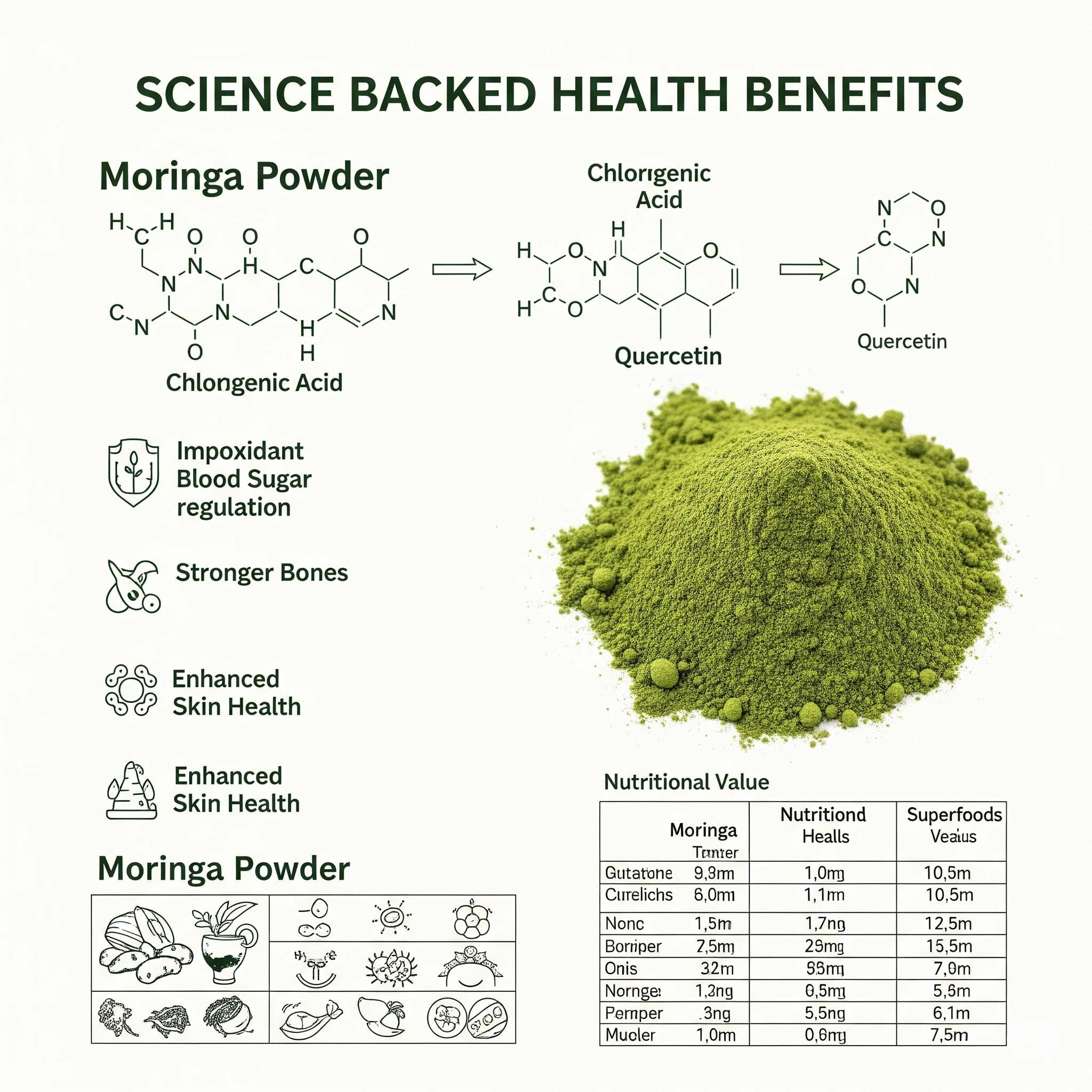In the ever-evolving world of superfoods, few plant-based supplements have attracted as much interest as moringa powder and for good reason. Derived from the nutrient-dense leaves of the Moringa oleifera tree, this vibrant green powder is celebrated in traditional medicine and modern science alike for its wide range of health benefits.
Moringa is often referred to as the “miracle tree,” and with its rich profile of vitamins, minerals, amino acids, and antioxidants, it’s easy to see why. Let’s explore the science-supported ways that moringa powder can support and enhance your overall health.
1. Natural, Sustained Energy Without Caffeine
Unlike stimulants like coffee or energy drinks, moringa delivers a clean energy boost that doesn’t rely on caffeine. It is naturally high in iron and magnesium, two critical minerals involved in energy metabolism and oxygen transport throughout the body.
-
Iron helps in the production of red blood cells, which carry oxygen to muscles and tissues, reducing fatigue and tiredness.
-
Magnesium supports ATP (adenosine triphosphate) synthesis—the body’s primary energy currency.
Together, these nutrients help improve physical stamina and mental alertness without the highs and crashes of caffeine-based energy sources.
2. Immune System Support and Illness Prevention
One of moringa’s most researched benefits is its ability to strengthen the immune system. It’s particularly high in vitamin A (beta-carotene) and vitamin C, both of which are critical for the development and function of immune cells.
Additionally, moringa contains powerful antioxidants and anti-inflammatory compounds, such as:
-
Quercetin – An antioxidant that helps lower blood pressure and reduce allergy-related inflammation.
-
Kaempferol – A flavonoid known for its anti-inflammatory, antimicrobial, and anticancer properties.
These compounds work synergistically to help the body fend off infections, reduce oxidative stress, and regulate immune responses.
3. Blood Sugar Regulation and Diabetes Management
Moringa shows significant promise in managing blood glucose levels, making it especially valuable for individuals with type 2 diabetes or insulin resistance.
Several studies suggest that compounds like chlorogenic acid and isothiocyanates found in moringa:
-
Slow the absorption of glucose in the intestine
-
Improve insulin sensitivity
-
Reduce post-meal blood sugar spikes
One study published in the Journal of Food Science and Technology found that diabetic participants who consumed moringa experienced measurable reductions in blood sugar levels over time.
4. Cardiovascular Protection and Cholesterol Management
Moringa supports heart health in multiple ways. It contains high levels of potassium, which helps regulate blood pressure, and omega-3 fatty acids, which support arterial function and lower triglyceride levels.
Key cardiovascular benefits of moringa include:
-
Lowering LDL cholesterol (bad cholesterol) while preserving HDL (good cholesterol)
-
Reducing plaque buildup in the arteries due to its anti-inflammatory effects
-
Combating oxidative stress, which contributes to heart disease progression
These factors combined make moringa a natural ally in reducing the risk of heart attacks, strokes, and high blood pressure.
5. Skin and Hair Health from Within
Thanks to its rich blend of vitamins A, C, and E, moringa nourishes the skin and supports the body’s ability to produce collagen, a protein that keeps skin firm and youthful.
-
Vitamin A helps regulate sebum production and supports cell turnover
-
Vitamin C is essential for collagen synthesis and skin repair
-
Vitamin E protects against oxidative damage and premature aging
Moringa is also used in hair care, both topically and orally, as it contains zinc and amino acids that support hair follicle strength, thickness, and growth.
6. Digestive and Gut Health Benefits
Traditional medicine has long used moringa as a natural remedy for stomach ailments, and current research is beginning to back up these practices. Moringa leaves contain bioactive compounds such as isothiocyanates, which have been shown to protect the stomach lining and reduce inflammation in the gastrointestinal tract.
Additionally, the fiber in moringa helps:
-
Support gut microbiome diversity, promoting the growth of healthy gut bacteria
-
Improve nutrient absorption by supporting a healthier gut lining
-
Regulate bowel movements, preventing both constipation and diarrhea
These properties make moringa a helpful supplement for those managing irritable bowel syndrome (IBS), acid reflux, or general digestive discomfort.
7. Anti-Inflammatory and Chronic Disease Prevention
One of the most promising areas of moringa research involves its role in reducing chronic inflammation—an underlying factor in many serious conditions, including arthritis, obesity, cardiovascular disease, and even some cancers.
Key anti-inflammatory components in moringa include:
-
Isothiocyanates – plant-based compounds that inhibit inflammatory enzymes in the body
-
Flavonoids such as quercetin and kaempferol, which modulate the immune system and suppress the production of pro-inflammatory cytokines
A study published in Inflammopharmacology highlighted that moringa extract significantly reduced inflammation markers in lab animals, suggesting its potential use as a natural alternative to NSAIDs (non-steroidal anti-inflammatory drugs), without the side effects.
8. Brain Health and Cognitive Function
Emerging research also points to moringa’s neuroprotective potential. With its high levels of antioxidants, vitamin E, and polyphenols, moringa may help prevent or slow age-related cognitive decline.
Benefits include:
-
Improved memory and learning via antioxidant protection of neurons
-
Reduced oxidative stress in the brain, which is associated with diseases like Alzheimer’s
-
Mood support, as moringa may influence neurotransmitter balance (like serotonin and dopamine)
Some early studies even suggest moringa may offer antidepressant-like effects, although more human trials are needed.
9. Hormonal Balance and Women’s Health
Moringa has a long history of use in supporting women’s reproductive and hormonal health. Its combination of nutrients helps regulate hormonal fluctuations, especially during menstruation, pregnancy, and menopause.
Benefits for women may include:
-
Improved menstrual cycle regularity and reduced PMS symptoms due to iron and magnesium
-
Bone strength through calcium and phosphorus, especially beneficial post-menopause
-
Lactation support, as moringa is traditionally used as a galactagogue (a milk-boosting herb)
However, pregnant women should exercise caution, as high doses may have uterine stimulant effects. Always consult a healthcare provider before adding moringa to a prenatal routine.
How to Use Moringa Powder Effectively
Incorporating moringa into your daily wellness plan is easy with a few simple habits:
| Goal | How to Use Moringa |
|---|---|
| Energy & Focus | Add 1 tsp to a smoothie or green juice in the morning |
| Immune Support | Mix into warm water with lemon and ginger daily |
| Digestive Health | Stir into soups or sprinkle over savory dishes |
| Hair & Skin Benefits | Take consistently for 4–6 weeks; can also be used in DIY masks |
| Hormonal Balance | Blend with iron-rich meals or take alongside healthy fats |
Start small, about ½ to 1 teaspoon per day, and increase gradually to 1 tablespoon depending on your body’s needs and tolerance.


Leave a Reply